This post is also available in:
![]() 简体中文 (Chinese (Simplified))
简体中文 (Chinese (Simplified)) ![]() ไทย (Thai)
ไทย (Thai) ![]() 한국어 (Korean)
한국어 (Korean)
Syphilis is a bacterial sexually transmitted infection (STI) usually spread through vaginal, anal, or oral sex and/or skin-to-skin contact. Syphilis causes painless sores (called a chancre) that can easily spread the infection to other people. Syphilis is passed from person to person through direct contact with a syphilis sore. Syphilis can infect your vagina, anus, penis, scrotum, and sometimes your lips and mouth.
Syphilis infection can be active at times and inactive at other times. Symptoms can be easily missed in either situation. This makes it easy to pass it on to someone else without realising. The best way to know your status is to test regularly.
There are three main stages of syphilis infection: primary, secondary and tertiary. Syphilis can be easily cured with medication if you treat it early. Without treatment, it can get worse over time and cause serious health problems.
Signs and Symptoms
Content warning: click to show images of symptoms
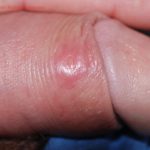
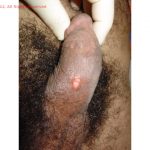
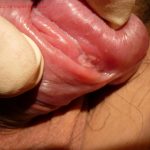
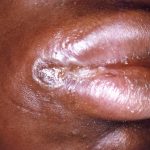
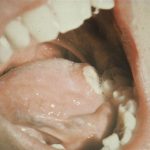
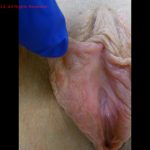


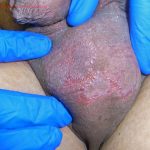
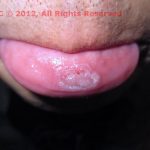
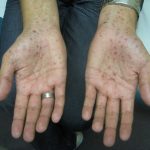

Each stage of syphilis has different symptoms but is very commonly asymptomatic, so it’s important to test regularly.
PRIMARY – ‘Stage One Syphilis’
Primary syphilis is highly contagious. Symptoms usually begin as a sore (chancre) on the genital area, anus or mouth. While most people with primary syphilis develop only one chancre, others develop several.
Syphilis can be asymptomatic, but if symptoms do occur, it will usually be within 3 or 4 weeks of exposure (although it can take up to 90 days for the sore to appear). If left untreated, primary syphilis can progress to secondary and tertiary syphilis.
Primary syphilis often shows no symptoms. If symptoms are present, they may include:
- Very small pimple or tear in the skin, with no tenderness or pain
- A sore with raised edges, up to two centimetres wide
- A shiny, glossy or mucousy patch on the skin that may resemble an ulcer
- Something that looks like a wart but goes away
- Something that looks like a herpes sore but goes away and may be painless
- Spots on the body that appear like a small sweat rash, not itchy
- Painless spot on your tonsil
- A feeling like you have bitten your cheek
Primary syphilis lasts a few weeks, and symptoms can be painless or tender. For this reason, many people do not notice the symptoms. The symptoms go away after a few weeks. At this point, secondary syphilis develops.
Primary syphilis can overlap with secondary syphilis for a few weeks.
SECONDARY – ‘Stage Two Syphilis’
If you do not receive treatment during the initial appearance of symptoms, the bacteria that causes syphilis can spread into your bloodstream, and you can develop secondary syphilis. The symptoms of secondary syphilis develop 2 to 8 weeks after a primary syphilis infection. The secondary stage is usually marked by a non-itchy rash. If left untreated, secondary syphilis may progress to latent or tertiary syphilis.
Secondary syphilis symptoms can be very mild or not exist at all. Effects and symptoms of secondary syphilis can include:
- Body rash, which comes and goes and may be:
- Reddish or brownish or blotchy
- Not itchy
- It can be anywhere but commonly on the hands or soles of the feet
- The rash comes and goes and can be small and not noticeable
- Generally feeling unwell, which comes and goes and can include:
- Flu-like symptoms
- Sore throat
- Fatigue, low-energy
- Swollen lymph nodes
- Joint pain
- Loss of appetite
- Hair loss (not always noticeable)
These symptoms can come and go or appear to resolve on their own.
Secondary syphilis can last for many years before developing into tertiary syphilis.
Condylomata Lata
During secondary syphilis, the person can also develop ‘Condylomata Lata’. This is when the Syphilis bacteria starts to live within skin folds in the genital, mouth and anal regions. This condition has no clearly defined symptoms; however, it increases transmission risk because the bacteria is concentrated.
Treating syphilis will also treat condylomata lata.
Latent stage syphilis
If untreated, secondary syphilis may progress to the latent (meaning ‘hidden’ or ‘dormant’) phase. Not everyone who has syphilis will go through this stage. There won’t be any symptoms for those who do, maybe for years. In some cases, symptoms will never return. But the infection isn’t gone; the bacteria remain inactive in the body and will still appear in a test.
Transmission risks during the latent phase are much lower than during other stages, but transmission is still possible, including during pregnancy.
TERTIARY – ‘Late Latent Stage Syphilis’
Tertiary syphilis can overlap with secondary syphilis.
Tertiary syphilis can appear up to 30 years after primary infection. At this stage, the bacteria can damage almost any part of the body, including the heart, brain, spinal cord, eyes and bones, resulting in heart disease, mental illness, blindness, deafness and neurological problems.
Approximately one-third of people not treated for syphilis will develop tertiary syphilis. Symptoms of tertiary syphilis vary depending on the organ system affected. People are not usually infectious at this stage.
Late latent syphilis can be diagnosed with the syphilis blood test.
Symptoms and effects of tertiary syphilis may include:
- Problems controlling muscle movements
- Numbness
- Vision problems
- Hearing problems
- Dementia symptoms
- Seizures, hallucinations, stroke, mental disturbance
- Incontinence
- Meningitis
- Non-cancerous lesions on the skin, mouth and internal tissues
- Inflammation of the aorta in the heart (the largest artery in the body) can cause a thinning of the lining of the aorta and can cause death.
There is no risk of skin-to-skin transmission during tertiary syphilis.
Tertiary syphilis is curable with diagnosis and treatment. But if it has already affected the body or organs, the damage may be irreversible. Even if treated, it may have permanently damaged the heart and brain.
Transmission
Syphilis is usually spread through skin-to-skin contact during vaginal, anal or oral sex with a person in the first 2 stages of the infection. It can also be spread by direct contact with open sores on areas such as the lips, mouth, breasts or genitals. People with tertiary syphilis are not usually infectious.
Syphilis is highly contagious when a sore or rash is present but can also be passed on when a person has no symptoms. Syphilis can occasionally be spread by blood contamination, needle-stick injury, or sharing injecting equipment.
Pregnant people with syphilis can pass the infection to their baby during pregnancy or birth.
Syphilis can be transmitted via
- Any sexual activity that means your genitals, anal area, or mouth come into contact with the bacteria that causes syphilis
- Rubbing, nudging and other forms of skin-to-skin contact that involves the genitals, anal area and/or mouth
- Unprotected vaginal or anal sex
- Covered/protected vaginal or anal sex, if the skin touches an area that has syphilis
- Condomless oral sex
- Covered/protected oral sex, if the mouth touches an infected area
- Touching syphilis sore with your fingers then touching a mucous membrane (such as your eyes, inside of your nose or mouth, or your genitals)
- Sharing sex toys
- It is also passed on during pregnancy and birth
Sharing saliva without direct contact with a syphilis symptom inside another person’s mouth is considered low-risk.
You cannot get syphilis from sharing food or drinks, hugging, holding hands, coughing, sneezing, sharing towels, or sitting on toilet seats.
Blood-to-blood contact
While very rare, syphilis transmission can happen due to blood-to-blood contact.
Blood transmission of syphilis can occur when sharing injecting equipment or if blood comes into contact with an open or bleeding wound like an ulcer or bleeding gums. There are very few cases of people contracting syphilis through blood-to-blood contact.
Prevention
As syphilis can be asymptomatic, regular sexual health screening is highly recommended. You can view a list of sex worker-friendly sexual health clinics on our Where To Test page.
Additional ways to prevent syphilis transmission include:
- Check clients for visible STI symptoms before the booking goes ahead. Use light and gloves if possible.
- Wash your hands after the check if you don’t use gloves.
- Use condoms and dams during genital contact – remember that symptoms are usually not noticeable.
- Use condoms and/or dams for oral sex/rimming, and check for syphilis symptoms outside the area covered by a condom or dam.
- Cover toys with condoms, and wash and re-cover before using on yourself.
- Put a bandaid on anything that looks like a symptom of primary syphilis.
- Cover symptoms of primary syphilis with a towel.
- Reconsider deep kissing.
- Do face-down body rubs and body slides to avoid genital contact with symptoms of primary syphilis.
- Reduce contact between genitals.
- Always use fresh, sterile syringes and injecting equipment and dispose of them safely. You can use this website to find your nearest Needle Syringe Program (NSP).
It is recommended that you always change condoms when going from anal to vaginal or oral sex.
Testing
Here’s some information about testing for syphilis. You can view a list of sex worker-friendly sexual health clinics on our Where To Test page.
Testing method
- Blood test
- Skin swab of primary syphilis symptoms
When to Test
- It is possible to detect syphilis in a blood test 1-2 weeks after potential exposure, but it’s more likely to be detected after 6 weeks.
- Test if you think you may have syphilis symptoms.
- Test if you think you may have been exposed to syphilis.
Other Info
- Syphilis should be included in regular STI screening, but it’s worth checking with your nurse or doctor to make sure you are receiving the test.
- Sexual health clinic testing is often bulk billed, even if you don’t have Medicare, so the test will most likely be free.
- You may pay a fee or be bulk billed if you see a GP.
Treatment
Syphilis is treatable and best treated early. Here’s what you need to know about treating it.
Testing Method
- Antibiotic injection in the butt cheek or the side of the hip by the doctor or a nurse
- A single dose will cure early syphilis, but later stages require 3 injections, each a week apart.
- If you are allergic to penicillin, you can take an oral treatment for 14 or 28 days.
Costs and other information
- You will be tested again 3 months after treatment, and then usually 6 months and 12 months after treatment.
- Syphilis is cured by effective treatment, but you do not develop immunity. It is possible to get syphilis again.
- Sexual health clinic treatments are often bulk billed, even if you don’t have Medicare, so the treatment may be free.
- You may pay a fee or be bulk billed if you see a GP.
- Infection with syphilis can increase the risk of acquiring and transmitting HIV infection.
How might this impact my work?
Practical Considerations
- It is recommended that you do not have sex for 7 days after you finish treatment.
- If you can’t avoid having sex, then using a condom will help lower the chance of transmitting syphilis, but there is no guarantee, as the condom only protects the skin that it covers.
- Some antibiotics can reduce the effectiveness of oral contraception (‘the pill’).
- If you often get thrush when taking antibiotics, you may want to take probiotics during and after treatment to help prevent this.
- You should inform any recent doubles partners if you test positive for syphilis.
Legal and Reporting Considerations
- Some states and territories may have laws that criminalise sex working or having sexual contact while you have a BBV or STI. Check out our BBV, STI and the Law resource or contact your local sex worker peer organisation for more information.
- Contact tracing of previous sexual partners (known as ‘partner notification’) is a consideration for some BBV and STI. It should be done with consideration of the unique transmission risk and privacy needs of sex workers. Your local sex worker peer organisation can advise on any partner notification process to ensure it is appropriate for your circumstances.
- Syphilis is a nationally notifiable disease in Australia, meaning diagnosed cases of syphilis are anonymously reported to state or territory health departments.
